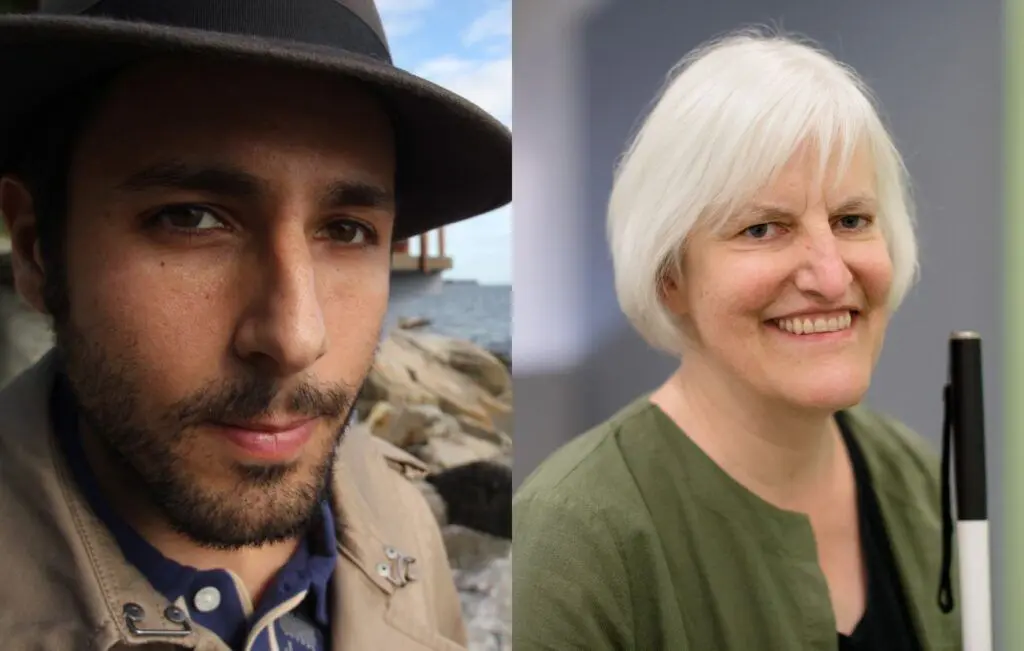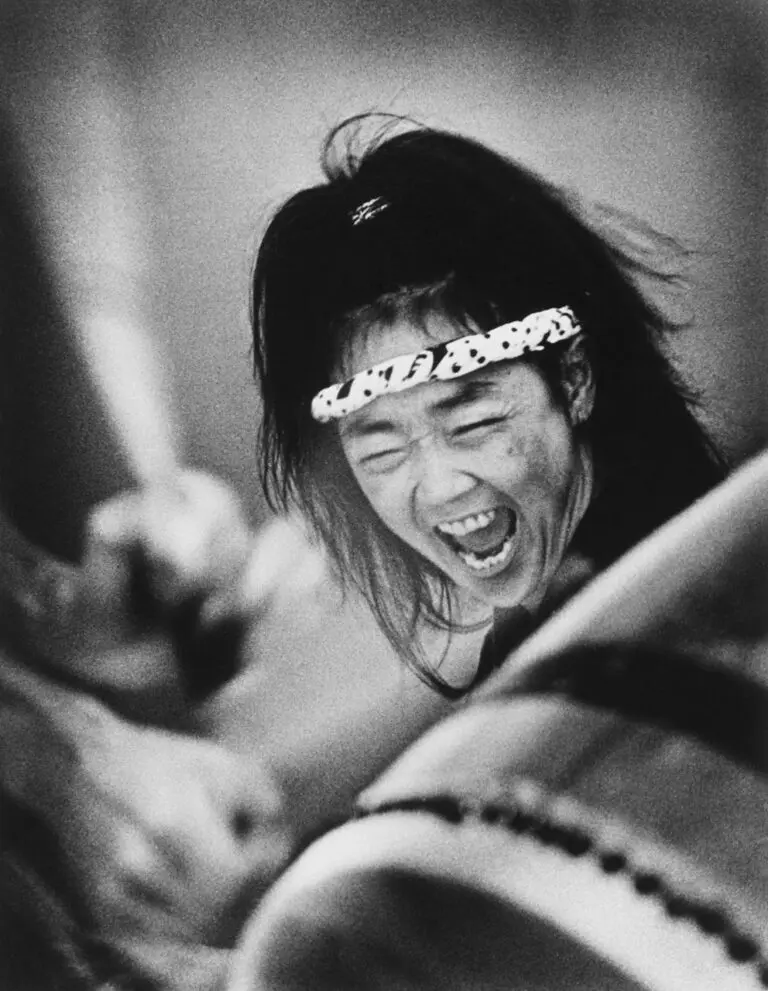Imagining Multisensory Art: Learning from Objects; Literacy and Inclusion | UBC Robson Square
Sat Jan 27, 2024 | 1–4 PM

Images: Courtesy of the artists
[Image description: Left: Against a blurry background of rocks and ocean, a close-up of the
artist Carmen Papalia, an olive-skinned man with brown eyes, a dark, close-trimmed beard, and a gray fedora.
Right: A tender close-up of Georgina Kleege is the focal point of the image. Georgina is smiling, facing forward. The background is blurred while Georgina is in clear focus. A white cane with a black taped handle is present as Georgina is holding it in this seemingly-Gallery environment.]
Please note that this event will take place at UBC Robson Square. Directions »
In partnership with the University of British Columbia, the Vancouver Art Gallery presents Imagining Multisensory Art: Learning from Objects; Literacy and Inclusion as part of the ongoing speaker series, UBC Connects.
This free, half-day event will address how collaboration between institutions of learning and art can advance accessibility. It also aims to raise awareness around non-visual participation in the art world through multi-sensory approaches art.
Developed in collaboration with a group of researchers, artists, thought leaders and activists, the program will begin with a conversation between the core team of organizers from UBC, including Dr. Ruanne Lai, Research and Knowledge Translation Facilitator Vision: Molecules, Behaviour, Society Research Excellence Cluster; Dr. Stefan Honisch, Honorary Research Associate and Sessional Lecturer in the Department of Theatre Studies; Mx. Rahbar, PhD Student, Library and Information Science; Dr. Laura Yvonne Bulk, Assistant Professor of Teaching in Occupational Science and Occupational Therapy; and Stephanie Bokenfohr, Public Programs Coordinator at the Vancouver Art Gallery. They will discuss how their collaboration was initiated.
A conversation between writer and scholar Dr. Georgina Kleege and non-visual social practice artist Carmen Papalia will follow. They will discuss non-visual and tactile approaches to accessing art, while sharing details of their past collaboration and future aspirations for accessibility and the arts.
The entire afternoon is intentionally designed to create a space for tactile and non-visual participation with care, enjoyment and respect.
Refreshments will be provided.
Participants will be seated in small groups, and materials will be provided throughout the event to allow for co-creation and play. We will all learn from objects and artworks together.
Event Schedule
- 12:30 PM | Doors open
- 1:00 PM | Welcome and Refreshments
- 1:30 PM | Program Begins
- 2:00 PM | Panel Discussion with Core Group of Organizers
- 2:30 PM | A Conversation between Dr. Georgina Kleege and Carmen Papalia, followed by haptic encounters with art
- 4:00 PM | Program ends
WELCOMING AND ACCESSIBILITY
This event has been planned with equitable access and universal design in mind. It will include CART (Communication Access Realtime Translation), sign language interpretation services and an inclusive wayfinding guide to the elevators.
We strive to meet all access needs. If you have any requests or questions about accessibility at this event, please contact Stephanie Bokenfohr, Public Programs Coordinator, at sbokenfohr@vanartgallery.bc.ca.
ABOUT THE SPEAKERS
ABOUT THE ORGANIZERS
Dr. Laura Yvonne Bulk is Assistant Professor of Teaching in the Master of Occupational Therapy Program at the University of British Columbia. Dr. Bulk has conducted extensive research in justice, equity, diversity and inclusion, with a particular focus on fostering a sense of belonging among students and clinicians with disabilities in the health and human services. Dr. Bulk aims to contribute to shaping a more just and hospitable world for everyone through her research, teaching and educational leadership. Since 2014, she has been teaching in various contexts using research-based theatre, storytelling, inclusive techniques and active learning strategies. She aims to assist learners in equipping themselves to become confident, socially accountable and competent Occupational Therapists who have the skills to challenge ableism, colonialism, racism and other forms of oppression and transform the environments in which they work.
Dr. Stefan Honisch is a Sessional Instructor in the Department of Theatre and Film, at the University of British Columbia, having previously held a Banting Postdoctoral Fellow within the department for a project on the musical life of Helen Keller (1880-1968). His research interests are at the intersection of Critical Disability Studies, Music and Critical Pedagogy. His first monograph project Vulnerable Virtuosities: Disability in Concert and Competition (in progress) uses a Disability Justice framework to explore how blind virtuoso pianists radically challenge stubborn dualisms of musical strength and weakness, demonstrating that vulnerable manifestations of disabled embodiment intensify the aesthetic and expressive power of musical virtuosity. In addition to his research and teaching, Honisch remains active as a freelance musician and serves on the Review Board of Journal of Teaching Disability Studies, the Editorial Board of Public Disability History, and the Council of the American Musicological Society. Strongly committed to service, Honisch serves on UBC Arts Amplifier’s Stakeholder Advisory Committee, and UBC’s Committee to Increase Speaker Diversity. He is also part of the team for the three-year SSHRC Partnership Development Grant “Canadian Accessible Musical Instruments Network.”
Dr. Ruanne Lai completed her Ph.D. in Cell & Developmental Biology in the Department of Ophthalmology & Visual Sciences at the University of British Columbia. In 2009, she received a Master of Science degree in Kinesiology and Health Science, investigating the effect of chronic contractile activity on mRNA stability in skeletal muscle in a rodent model. In 2007, she received a Bachelor of Fine Arts degree double majoring in Dance and Kinesiology from York University. Previously, she has worked for the CNIB (Canadian National Institute for the Blind) in Research Communications, Advocacy and Peer Support. In 2021, she completed a Knowledge Translation Professional Certificate (SickKids/UofT). Dr. Lai was an ARVO Science Communication Training Fellow and a member of the ARVO Advocacy & Outreach Committee.
Mx. Rahbar is a PhD student at the University of British Columbia School of Information. Rahbar’s research interests include cultural representation in manga, seeking out narratives around disability and neurodiversity, and manga in postsecondary education and academic library collections. She applies her research to the needs of libraries, speaking on manga for teen and adult readers at academic conferences and anime conventions. Other areas of interest include accessibility, censorship, localization, materiality, and the reading experience. Previously she worked in academic libraries.


